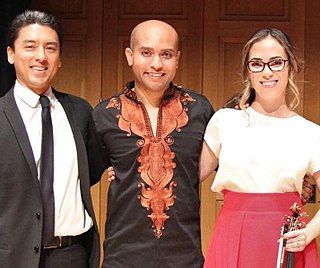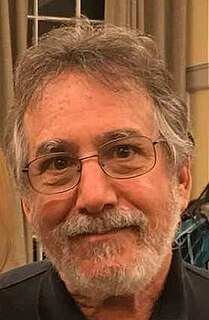Related Research Articles
The heckelphone is a musical instrument invented by Wilhelm Heckel and his sons. The idea to create the instrument was initiated by Richard Wagner, who suggested it at the occasion of a visit of Wilhelm Heckel in 1879. Introduced in 1904, it is similar to the oboe but, like the bass oboe, pitched an octave lower, the heckelphone having a significantly larger bore.
John Harris Harbison is an American composer, known for his symphonies, operas, and large choral works.

A wind quintet, also known as a woodwind quintet, is a group of five wind players.
Ruth Dorothy Louisa ("Wid") Gipps was an English composer, oboist, pianist, conductor, and educator. She composed music in a wide range of genres, including five symphonies, seven concertos, and numerous chamber and choral works. She founded both the London Repertoire Orchestra and the Chanticleer Orchestra and served as conductor and music director for the City of Birmingham Choir. Later in her life she served as chairwoman of the Composers' Guild of Great Britain.
Alex Klein is an oboist who began his musical studies in his native Brazil at the age of nine, and made his solo orchestral debut the following year. At the age of eleven he was invited to join the Camerata Antigua, one of Brazil's foremost chamber ensembles. During his teenage years he toured and performed as a soloist, recitalist and as a member of several professional orchestras in Brazil. He then studied at the Oberlin Conservatory of Music with James Caldwell, earning a BM and an artist diploma in music performance.

Eric Ewazen is an American composer and teacher.
Arthur Weisberg was an American clarinetist, bassoonist, conductor, composer and author.
Sean Osborn is a former clarinetist of the Metropolitan Opera Orchestra and a regular substitute in the clarinet section of the Seattle Symphony Orchestra. He has been a student of Stanley Hasty, Frank Kowalsky, and Eric Mandat.
Robert Paterson is an American composer of contemporary classical music, as well as a conductor and percussionist. His catalog includes over 100 compositions. He has been called a "modern day master" and is primarily known for his colorful orchestral works, large body of chamber music and clear vocal writing in his operas, choral works, vocal chamber works and song cycles.
Robert Charles Suderburg was an American composer, conductor, and pianist.

Martha Goldstein was an American harpsichordist and pianist, who gave concerts in the United States, North Africa, the Middle East, and Europe. She performed works by George Frideric Handel, Frédéric Chopin, Georg Philipp Telemann, Franz Liszt, Ferruccio Busoni, Johann Sebastian Bach, and others.

Graham Waterhouse is an English composer and cellist, focused on chamber music. For his own instrument, he composed a cello concerto, Three Pieces for Solo Cello and Variations for Cello Solo. He has written string quartets and compositions which juxtapose a quartet with a solo instrument, including Piccolo Quintet, Bassoon Quintet and Rhapsodie Macabre. He has set poetry for speaking voice and cello, such as Der Handschuh, and has written song cycles. His compositions reflect the individual capacity and character of players and instruments, from piccolo to contrabassoon.

The Soni Ventorum Wind Quintet was an American wind quintet that was officially founded in 1962 when Pablo Casals asked its members to become the woodwind faculty of his newly founded Conservatory of Music of Puerto Rico. It is known worldwide for its many international tours sponsored by the United States Department of State including three tours of South America and three of Europe. Over 25 original chamber works for winds have been written for the members of Soni Ventorum including compositions by Claude Arrieu, William Bergsma, Jean Francaix, Gerald Kechley, Joseph Goodman, John Verrall, and William O. Smith. In 1972 the quintet won the silver medal at the International Instrumental Ensembles Competition in Rio de Janeiro.

The Wind Quintet, Op. 26, is a chamber music composition by Arnold Schoenberg, composed in 1923–24. It is one of the earliest of Schoenberg's compositions to use twelve-tone technique.

Derrick Skye is a composer, conductor, musician, and educator based in the Los Angeles area who often integrates musical practices from cultures around the world in his work with classical music communities. The Los Angeles Times has described Skye's music as "something to savor" and "enormous fun to listen to."
William McColl is an American clarinetist and professor of music.
Laila Storch is an American oboist and the first woman oboist to graduate from the Curtis Institute in Philadelphia, where she studied with Marcel Tabuteau.
Felix Skowronek was an American flutist and professor of music.

David Froom is an American composer and college professor. Froom has taught at the University of Utah, the Peabody Institute and the University of Maryland, College Park. He has been on the faculty at St. Mary's College of Maryland since 1989. He has received awards and honors from the Guggenheim Foundation, the American Academy of Arts and Letters,, the Fromm Foundation at Harvard, the Koussevitzky Foundation of the Library of Congress, the Barlow Foundation, and is a five-time recipient of an Individual Artist Award from the State of Maryland.
Bram van Sambeek is a Dutch bassoon soloist and teacher.
References
- ↑ Dunphy, Mary Elayne (22 September 1968). "Wind Quintet Joins U.W. Music School" (PDF). The Seattle Times.
- ↑ Ament, Deloris Tarzan (1 August 1993). "Budget Cuts Target Safety, Classes At UW Art School". The Seattle Times. Retrieved 22 September 2013.
- ↑ "Soni Ventorum - Artists" . Retrieved 22 September 2013.
- ↑ "Basoonist Arthur Grossman". CD - Crystal Records Dist. #840. Crystal Records.
- ↑ Bargreen, Melinda (16 October 1996). "For Bassoon Fans, It Was A Night To Remember". The Seattle Times. Retrieved 20 September 2013.
- ↑ Hurd, Peter (2001). "Renaissance for Heckelphone". The Double Reed. 24 (1): 86. Retrieved 22 September 2013.